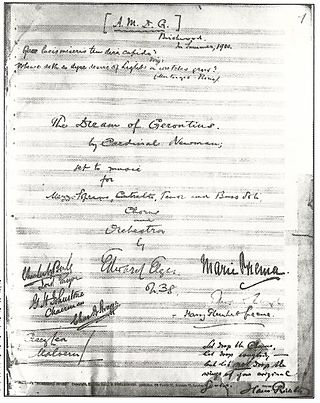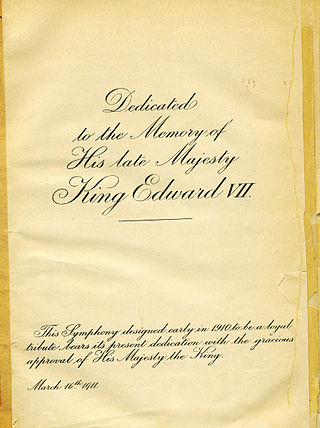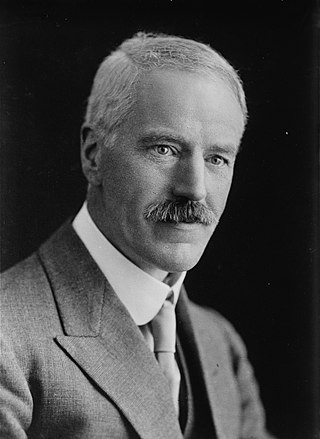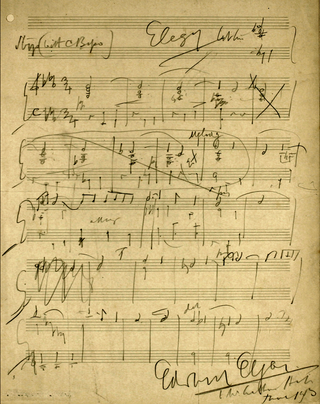
Sir Edward William Elgar, 1st Baronet, was an English composer, many of whose works have entered the British and international classical concert repertoire. Among his best-known compositions are orchestral works including the Enigma Variations, the Pomp and Circumstance Marches, concertos for violin and cello, and two symphonies. He also composed choral works, including The Dream of Gerontius, chamber music and songs. He was appointed Master of the King's Musick in 1924.
The Pomp and Circumstance Marches, Op. 39, are a series of five marches for orchestra composed by Sir Edward Elgar. The first four were published between 1901 and 1907, when Elgar was in his forties; the fifth was published in 1930, a few years before his death; and a sixth, compiled posthumously from sketches, was published in 1956 and in 2005–2006. They include some of Elgar's best-known compositions.

The Dream of Gerontius, Op. 38, is a work for voices and orchestra in two parts composed by Edward Elgar in 1900, to text from the poem by John Henry Newman. It relates the journey of a pious man's soul from his deathbed to his judgment before God and settling into Purgatory. Elgar disapproved of the use of the term "oratorio" for the work, though his wishes are not always followed. The piece is widely regarded as Elgar's finest choral work, and some consider it his masterpiece.

Edward Elgar's Violin Concerto in B minor, Op. 61, is one of his longest orchestral compositions, and the last of his works to gain immediate popular success.
Gordon Percival Septimus Jacob CBE was an English composer and teacher. He was a professor at the Royal College of Music in London from 1924 until his retirement in 1966, and published four books and many articles about music. As a composer he was prolific: the list of his works totals more than 700, mostly compositions of his own, but a substantial minority of orchestrations and arrangements of other composers' works. Those whose music he orchestrated range from William Byrd to Edward Elgar to Noël Coward.

Sir Edward Elgar's Symphony No. 2 in E♭ major, Op. 63, was completed on 28 February 1911 and was premiered at the London Musical Festival at the Queen's Hall by the Queen's Hall Orchestra on 24 May 1911 with the composer conducting. The work, which Elgar called "the passionate pilgrimage of the soul", was his last completed symphony; the composition of his Symphony No. 3, begun in 1933, was cut short by his death in 1934.

Crown Imperial is an orchestral march by William Walton, commissioned for the coronation of King George VI in Westminster Abbey in 1937. It is in the Pomp and Circumstance tradition, with a brisk opening contrasting with a broad middle section, leading to a resounding conclusion. The work has been heard at subsequent state occasions in the Abbey: the coronation of Queen Elizabeth II in 1953, the wedding of Prince William in 2011 and the coronation of King Charles III in 2023. It has been recorded in its original orchestral form and in arrangements for organ, military band and brass band.

In the South (Alassio), Op. 50, is a concert overture composed by Edward Elgar during a family holiday in Italy in the winter of 1903 to 1904. He was working on a symphony, but the local atmosphere inspired him instead to write what some have seen as a tone poem, with an Italian flavour. At about 20 minutes' duration it was the composer's longest sustained orchestral piece to that time.

Sir Ivor Algernon Atkins was the choirmaster and organist at Worcester Cathedral from 1897 to 1950, as well as a composer of songs, church music, service settings and anthems. He is best known for editing Allegri's Miserere with the famous top-C part for the treble. He is also well known for "The Three Kings", an arrangement of a song by Peter Cornelius as a choral work for Epiphany.

The Sonata in G major, Op. 28 is Edward Elgar's only sonata composed for the organ and was first performed on 8 July 1895. It also exists in arrangements for full orchestra made after Elgar's death.

Hugh Blair was an English musician, composer and organist.
The Serenade for String Orchestra in E minor, Op. 20, is an early piece in three short movements, by Edward Elgar. It was written in March 1892 and first performed privately in that year; its public premiere was in 1896. It became one of Elgar's most popular compositions, and has been recorded many times.
The Romance in E minor for violin and piano is a work by Edward Elgar composed in 1878 or 1879 and published in 1885 as his Opus 1.
Sevillana, or, as the composer titled it Sevillaña , is a short piece for orchestra by the English composer Edward Elgar written in 1884 and published as his Op. 7. It was first published by Tuckwood, with the composer's revision of 1889 published by Ascherberg in 1895. It was dedicated to W. C. Stockley, conductor of the Birmingham Festival.
Imperial March is a piece for full orchestra written by the English composer Edward Elgar to celebrate the Diamond Jubilee of Queen Victoria in 1897, as his Op. 32.
The Severn Suite, Opus 87, is a musical work written by Sir Edward Elgar. It is a late composition, written in 1930, the result of an invitation to write a test piece for the National Brass Band Championship. It was dedicated to his friend, the author and critic George Bernard Shaw.

From the Bavarian Highlands, Op 27 is a work for choir and orchestra by Edward Elgar.
The Overture in D minor is a transcription made in 1923 by Sir Edward Elgar of a musical work by George Frideric Handel composed in 1717-18.

Elegy, Op. 58 is a short piece for string orchestra by Edward Elgar, composed in 1909. It was written in response to a request for a short piece to commemorate deceased members of the Worshipful Company of Musicians. The work was composed within a month of the death of his close friend August Jaeger and may reflect Elgar's grief at his loss.













